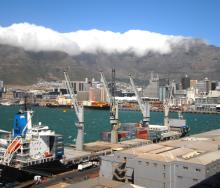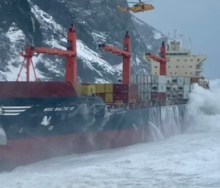The lack of access to good data is part of a bad problem in South Africa’s logistics industry, and Transnet is right at the centre of not sharing the best possible information it could with the freight industry, last week's Sapics Spring Summit in Johannesburg was told.
In a panel discussion about the use of command centres and how technology can assist with supply chain dynamics, Evert de Ruiter of Auctoro Advisory made a compelling case why the state-owned logistics utility “should be directed by the president to make a certain set of information publicly available”.
The consultant, who headed up Transnet’s command centre during the Covid-19 pandemic, said as long as this was the case, the National Logistics Crisis Committee (NLCC) tasked with solving perennial logjams, was at a data disadvantage.
“The information asymmetry in transportation, especially around rail and ports, is a disgrace.”
De Ruiter said proposals had been forwarded for years to address data discrepancies at the parastatal, but high-level fumbling had scuppered attempts to obtain quality data from Transnet.
“It really isn’t acceptable that it is where it is. I was inside the organisation and I have left. It hasn’t got better; it is worse.”
He said it should be remembered that the NLCC was a bureaucratic instrument that provided an additional layer of oversight to Transnet, and that its attempts to address long-standing port and rail issues were only as good as the kind of information at its disposal.
“Good data acts as a torch to the supply chain. Without it you die and what we don’t have at the NLCC around logistics is good data. We just don’t have it.”
De Ruiter’s outspoken views can’t be easy for him, as he was a principal participant in establishing one of the operational workstreams of the NLCC.
He is also one of the most respected thought leaders on the supply chain speaker circuit and knows a thing or two about disconnects, especially when people think any kind of data will reveal the failure of systems.
“A clue that you’re not looking at good data is when you’re looking at a PowerPoint slide. A PowerPoint slide is not good data, it’s someone massaging the data.
“What’s missing at the NLCC is that we’re looking at too many PowerPoints.”
He said invariably it was an opinion as opposed to a reflection of Transnet’s performance.
By way of example, he referenced the energy utility’s data dashboard, which is live and updated accordingly.
“At a very basic level, you can actually talk to Eskom about their information and have an opinion about it. You’re not debating the data any more.”
But ultimately operational efficiency through problem-solving depends on effective communication – the kind that has a heartbeat behind it.
“The blind spot in the supply chain is how people interact. Command centres and supply chain collaborations always fall flat because we’re having very bad conversations.”
No matter how good an organisation’s software and technology are, “it starts with people.”
Likening the command centre process to herding a bunch of cats, De Ruiter said technology and software should only be added once an organisation had seen its staff having quality conversations with one another, especially at the decision-making level.
Thinking back to his own experience at Transnet’s command centre during Covid, he remarked it had been a privilege and a nightmare all in one.
Of the 12 people on his command centre team, he knew only one when they started and met eight more after the lockdowns.
“We had to work virtually without systems or anything, but we were up and running within 72 hours. It was really about setting up structured phone calls and openly sharing information.”
Now, in hindsight, he cautions against thinking that command centres can solve supply chain problems because adaptability – not getting stuck with a fixed process in an ever-changing environment – is the key to adequately responding to deviation in cargo flows.
“You need to make sure that you’re talking across the area that you have command or influence over.”













